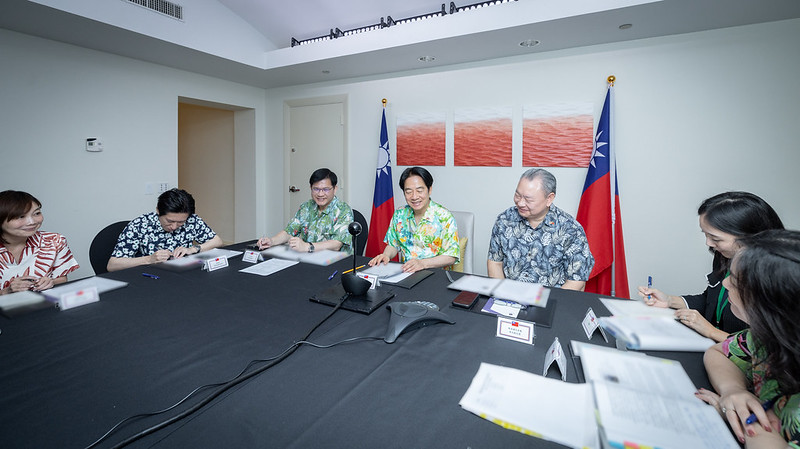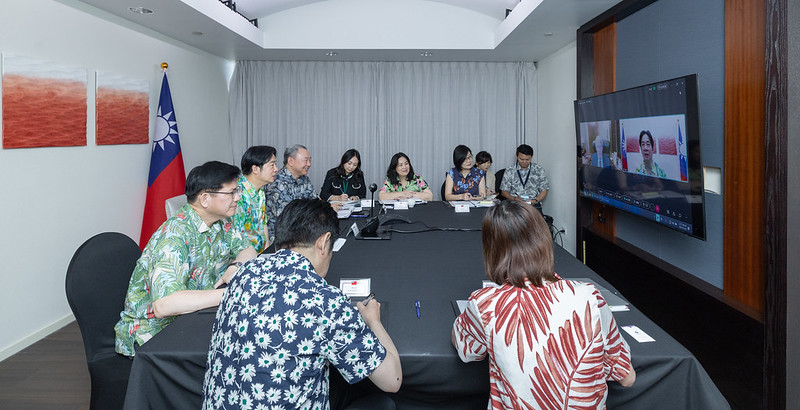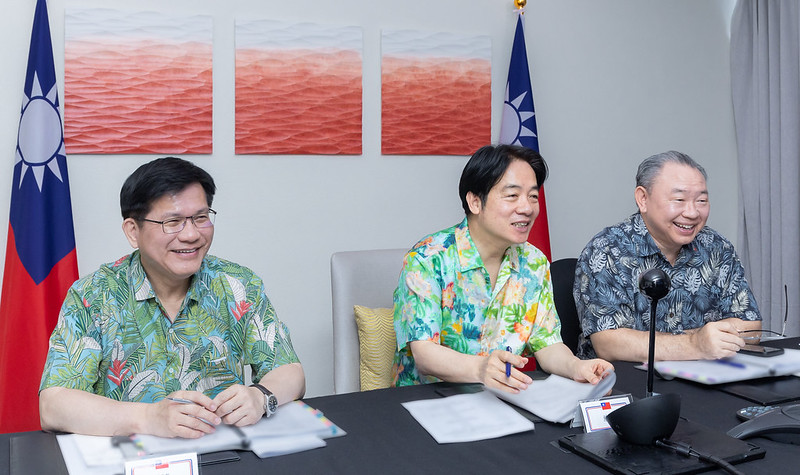News & activities
 News releases
News releases
On November 30 and December 4 (local time), President Lai Ching-te made transit stops in Hawaii and Guam, respectively, en route to state visits to diplomatic allies the Republic of the Marshall Islands, Tuvalu, and the Republic of Palau. On the morning of December 1 (early morning of December 2 Taipei time) in Hawaii, the president spoke by phone with Speaker Emerita of the United States House of Representatives Nancy Pelosi, and on the morning of December 5 (morning of the same day Taipei time), he spoke by phone or conducted a videoconference with bipartisan friends including Speaker of the US House of Representatives Mike Johnson, US House of Representatives Democratic Leader Hakeem Jeffries, and Republican Ranking Member of the US Senate Armed Services Committee Senator Roger Wicker, exchanging views on a wide range of issues. Following those conversations, Presidential Office Spokesperson Karen Kuo (郭雅慧) gave a briefing on the topics covered in their discussions.
Spokesperson Kuo stated that when President Lai spoke with Speaker Emerita Pelosi, she welcomed the president to the US, congratulated him once again on his election victory, and wished him a smooth trip during his visit to Taiwan’s Pacific allies and transit stop in Guam. Regarding the Taiwan-US double taxation issue, Speaker Emerita Pelosi said that Taiwan has bipartisan support in the US Congress, she understands the importance of resolving the issue to avoid Taiwan-US double taxation, and she hopes to help Taiwan with respect to completing legislation as soon as possible. Regarding the importance of Taiwan, Speaker Emerita Pelosi praised the people of Taiwan for their courage, commitment to freedom and democracy, and successful economic development, and said that without Taiwan in the Indo-Pacific, the consequences for regional security and the global economy would be unimaginable.
Spokesperson Kuo mentioned that Speaker Emerita Pelosi expressed support for Taiwan’s participation in international organizations, and said she has previously contacted the World Health Organization and will continue to promote Taiwan’s participation in international affairs. Speaker Emerita Pelosi also remarked that she has had a favorable impression of Taiwan since she visited in the 1980s, and is extremely proud of Taiwan’s environment and the key role it plays in the semiconductor supply chain. President Lai and Speaker Emerita Pelosi then exchanged views regarding topics including the semiconductor industry, AI, and China’s military threat to Taiwan in a cordial conversation of about 20 minutes.
After President Lai’s conversations by phone or videoconference with Speaker Johnson, Leader Jeffries, and Senator Wicker, Spokesperson Kuo gave a briefing on those discussions, stating that all expressed a sincere welcome and best wishes to President Lai on his transit through the US during this trip. They also conveyed staunch bipartisan support in Congress for assisting Taiwan in defending democracy and freedom, as well as hopes to jointly deepen Taiwan-US relations and promote peace, stability, and prosperity in the Indo-Pacific region.
Spokesperson Kuo remarked that President Lai also thanked Speaker Johnson and Leader Jeffries for the congratulatory letters they sent him this year, both when he took office and in October on our National Day, and for taking the lead in promoting many Taiwan-friendly motions in Congress, consistently demonstrating support for democratic Taiwan. Speaker Johnson and Leader Jeffries also welcomed President Lai to the US for his transit stops, wished him a productive visit to Taiwan’s Pacific allies, and said they hope to have more opportunities to interact with him again in the future.
Spokesperson Kuo said that Speaker Johnson emphasized that there is a strong bipartisan consensus in Congress on responding to China’s challenges and threats, that Taiwan’s security is the core of US Indo-Pacific strategy, and that they are using the annual National Defense Authorization Act (NDAA) to strengthen the US response to China and help Taiwan bolster its defense capabilities. Leader Jeffries expressed staunch support for Taiwan’s freedom and democracy, and mentioned that he recently led a delegation to the Caribbean and saw how Taiwan’s cooperation with countries in the Western Hemisphere is making a positive contribution to regional prosperity and development.
During their conversations with President Lai, Spokesperson Kuo said, both Speaker Johnson and Leader Jeffries made a point to mention that the Indo-Pacific Security Supplemental Appropriations Act, passed by Congress in April this year with bipartisan support, is extremely important in helping Taiwan and other Indo-Pacific allies safeguard regional peace and stability. They also both pledged to continue to promote motions in Congress that will help deepen the Taiwan-US partnership.
Spokesperson Kuo said that during their videoconference, President Lai thanked Senator Wicker for his long-term concern and the importance he has placed on Taiwan’s security, always supporting clauses favorable to Taiwan in congressional deliberations regarding the NDAA over the years. In the upcoming 119th Congress, Senator Wicker will chair the Senate Committee on Armed Services, and Taiwan looks forward to his continued support for strengthening security cooperation. The spokesperson said that President Lai also appreciates Senator Wicker’s “peace through strength” approach, adding that President Lai believes that as a key link in the first island chain, Taiwan has heavy responsibilities in regard to maintaining regional peace and stability. When faced with an ever-increasing threat, Taiwan will not retreat, and will stand together with the US and continue to strengthen defense capabilities and economic resilience. Taiwan looks forward to continued assistance from the US, and hopes to see cooperation in the field of national defense innovation.
Spokesperson Kuo stated that Senator Wicker expressed that China’s threat to Taiwan’s security must be taken seriously. He was pleased to see President Lai’s commitment to boosting Taiwan’s self-defense capabilities and resilience, and pledged to continue to push for higher US national defense budgets and a stronger military to support Taiwan’s security after assuming the role of chairman of the Senate Committee on Armed Services. As their conversation drew to a close, Senator Wicker also remarked that it has been many years since his last visit to Taiwan (in 2001 as a member of the House of Representatives), and he very much hopes to lead another delegation to Taiwan and meet with President Lai for more in-depth discussions.











